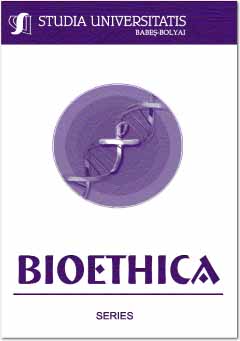DESPRE CONTROVERSA CE PRIVEȘTE DIMENSIUNEA NORMATIVĂ A CORPORALITĂȚII UMANE
ABOUT CONTROVERSY ON THE NORMATIVE DIMENSION OF THE HUMAN CORPOREALITY
Author(s): Marian MachinekSubject(s): Anthropology
Published by: Studia Universitatis Babes-Bolyai
Keywords: human bodiliness; moral normativity; ethical obligations; moral norms; moral judgement.
Summary/Abstract: About Controversy on the Normative Dimension of the Human Corporeality. Danger of falling into the trap of the naturalistic fallacy seems to unambiguously exclude bodiliness from the search for moral norms. But is it really true that there is no role for the body to play when the intellect occupies itself with formulating moral norms? Doubtless body constitutes – in a sense – the basis of morality, since human freedom can exist only as freedom incarnate. It would be equally difficult to question the statement that body constitutes boundaries for morality. Bodiliness may significantly restrain cognitive abilities of men; but it may also reduce their capabilities in fulfilling their moral obligations. Major controversy arises over the issue whether the body can influence the content of moral norms. Even if one accepts the validity of the thesis of an intransgressible boundary between the world of facts and the world of values, there is no doubt that man never experiences his body in merely the same way as he experiences other material objects. Bodily experience of self plays equally important role in ethical reflection. Hence some moralists point to bodiliness as something akin to a rough sketch (Rohskizze), a preliminary draft (Vorentwurf) of what is morally good and just. Corporeality marks certain areas (Dispositionsfeld) within which the intellect finds and formulates moral norms. Other thinkers go even further and stress that preliminary premises of moral judgement exist already in the very experience of bodiliness. In any event, though ultimately it is the practical intellect that formulates moral obligations, it does not do it in complete independence from the body.
Journal: Studia Universitatis Babes-Bolyai - Bioethica
- Issue Year: 58/2013
- Issue No: 2
- Page Range: 7-16
- Page Count: 10
- Language: Romanian

